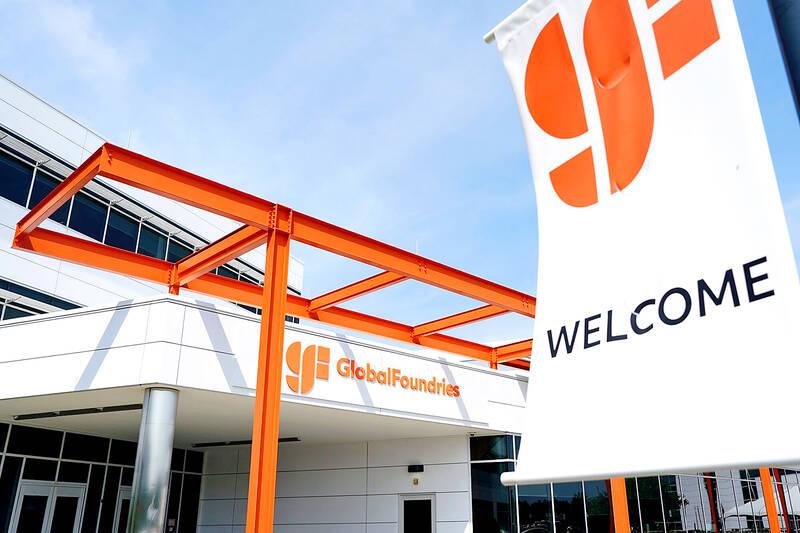GlobalFoundries Inc, the biggest US-based provider of made-to-order chips, announced a plan to spend US$16 billion to bolster domestic production.
The company is budgeting US$13 billion to expand existing plants in New York and Vermont and making a further US$3 billion commitment to research into advanced packaging and other technologies in the US, it said in a statement yesterday.
GlobalFoundries is the latest company to publicly commit billions to increasing US production of electronics — announcements that US President Donald Trump has touted as evidence that his policies are succeeding.

Photo: Cindy Schultz, Bloomberg
The chipmaker is making the investments with the endorsement of customers such as Apple Inc, Qualcomm Inc and General Motors Co, it said.
New chief executive officer Tim Breen said the company is not providing a detailed breakdown of when the cash will be spent and will remain flexible in order to match supply with demand.
The emphasis on the US is “a recognition of where there is the most unmet demand today,” he said in an interview.
Chip customers are looking for more local production and want to reduce dependence on suppliers that have their manufacturing concentrated in one location, Breen said.
“Supply security matters,” he said. Requests for more production out of US plants have increased during the last six months, he said.
Globalfoundries, based in Malta, New York, manufactures so-called essential chips for semiconductor and electronics makers. Such components do not require the most advanced production, but they do handle vital tasks, such as controlling power and managing the flow of data inside devices.
The artificial intelligence boom also is increasing demand for a variety of chips. The GlobalFoundries investment is “a strategic response to the explosive growth in artificial intelligence,” the company said.
The market has boosted the need for power-efficient and high-bandwidth chips used in data centers and communications equipment.
The company, which is majority-owned by the government of Abu Dhabi, had previously been more conservative in its investment plans, saying it would only add capacity when supported by demand.
On average, it has spent about US$1.4 billion on new plants and equipment annually over the last five years. That’s a fraction of the multiple tens of billions that companies like Intel Corp and Samsung Electronics Co have spent.
Globalfoundries operates plants in the US, Germany and Singapore. The company gave up on trying to compete with Taiwan Semiconductor Manufacturing Co (台積電) in the market for the most advanced production and has instead focused on cheaper techniques needed for other types of chips — components it says are becoming increasingly valuable.
GlobalFoundries says it is carving out lucrative niches of the semiconductor industry. That includes an effort to combine chips with optical data components and an alternative material for power management chips, called gallium nitride.

POWERING UP: PSUs for AI servers made up about 50% of Delta’s total server PSU revenue during the first three quarters of last year, the company said Power supply and electronic components maker Delta Electronics Inc (台達電) reported record-high revenue of NT$161.61 billion (US$5.11 billion) for last quarter and said it remains positive about this quarter. Last quarter’s figure was up 7.6 percent from the previous quarter and 41.51 percent higher than a year earlier, and largely in line with Yuanta Securities Investment Consulting Co’s (元大投顧) forecast of NT$160 billion. Delta’s annual revenue last year rose 31.76 percent year-on-year to NT$554.89 billion, also a record high for the company. Its strong performance reflected continued demand for high-performance power solutions and advanced liquid-cooling products used in artificial intelligence (AI) data centers,

SIZE MATTERS: TSMC started phasing out 8-inch wafer production last year, while Samsung is more aggressively retiring 8-inch capacity, TrendForce said Chipmakers are expected to raise prices of 8-inch wafers by up to 20 percent this year on concern over supply constraints as major contract chipmakers Taiwan Semiconductor Manufacturing Co (TSMC, 台積電) and Samsung Electronics Co gradually retire less advanced wafer capacity, TrendForce Corp (集邦科技) said yesterday. It is the first significant across-the-board price hike since a global semiconductor correction in 2023, the Taipei-based market researcher said in a report. Global 8-inch wafer capacity slid 0.3 percent year-on-year last year, although 8-inch wafer prices still hovered at relatively stable levels throughout the year, TrendForce said. The downward trend is expected to continue this year,

Vincent Wei led fellow Singaporean farmers around an empty Malaysian plot, laying out plans for a greenhouse and rows of leafy vegetables. What he pitched was not just space for crops, but a lifeline for growers struggling to make ends meet in a city-state with high prices and little vacant land. The future agriculture hub is part of a joint special economic zone launched last year by the two neighbors, expected to cost US$123 million and produce 10,000 tonnes of fresh produce annually. It is attracting Singaporean farmers with promises of cheaper land, labor and energy just over the border.

US actor Matthew McConaughey has filed recordings of his image and voice with US patent authorities to protect them from unauthorized usage by artificial intelligence (AI) platforms, a representative said earlier this week. Several video clips and audio recordings were registered by the commercial arm of the Just Keep Livin’ Foundation, a non-profit created by the Oscar-winning actor and his wife, Camila, according to the US Patent and Trademark Office database. Many artists are increasingly concerned about the uncontrolled use of their image via generative AI since the rollout of ChatGPT and other AI-powered tools. Several US states have adopted